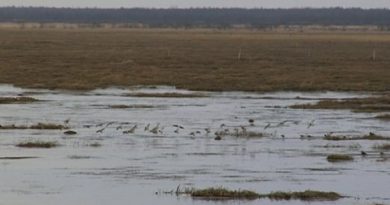Polar bear captivity rules loosened in Manitoba, Canada

Manitoba, Canada is being criticized for making it easier to take polar bears from the icy shores of Hudson Bay and place them in captivity.
The province — home to the polar bear capital of Churchill — has quietly lifted restrictions that had been in place for 30 years and which only allowed bears under the age of two to be put in zoos.
Some scientists are applauding the change. They say climate change is making it increasingly difficult for polar bears as the sea ice they need to hunt seals melts earlier in the spring and forms later in the fall. Confrontations with humans are becoming more frequent as the bears venture closer to civilization.
Conservation officials point out zoos have developed more sophisticated methods to help older polar bears adapt to captivity.
Second chance
Jim Duncan, director of the wildlife branch at Manitoba Conservation, said polar bears that used to be destroyed now can get a second chance at a zoo.
“It certainly gives us an opportunity to save some individual polar bears that would otherwise be euthanized,” Duncan said. “It also creates a tremendous research opportunity.”
But critics such as Zoocheck Canada say the province is selling out the northern creatures. Zoocheck argues polar bears don’t adjust well to captivity, regardless of age, and there are other ways of helping them deal with climate change besides putting them behind bars.
Zoocheck executive director Rob Laidlaw, who helped draw up the original restrictions, suggested Manitoba has turned back the clock 30 years.
He said polar bears are notorious for being one of the most difficult animals to keep in captivity, no matter what modern zoos can offer. The animals suffer from lack of space, lack of environmental complexity and inappropriate climate.
“They’re tinkering while Rome burns,” Laidlaw said of the Manitoba government. “These poor polar bears are suffering while they pat themselves on the back for doing wonderful things. This is bad news for polar bears.
“Polar bears around the world, including in North America, are still suffering probably more than most animals in captivity.”
Winnipeg’s Assiniboine Park Zoo has taken in two bears from Churchill since the restriction was lifted — a three-year-old named Storm who attacked a man in September and an 11-month-old orphan. The zoo was already home to two-year-old Hudson, a bear acquired from the Toronto Zoo.
The Winnipeg zoo is building a state-of-the-art enclosure that will allow polar bears to roam in a replica tundra. It is also striving to become an international research centre with a focus on how climate change is affecting the iconic mammals.
Educational tool
Zoo director Dr. Brian Joseph said lifting the restriction allows bears that have clashed too many times with humans to find a home at the zoo, where they become an important educational tool.
“We would like all the polar bears to live in the wild but that’s simply not possible,” he said. “For many years, those bears have just been quietly euthanized. To me, that’s a terrible waste when they can serve to inspire people, especially children.”
Joseph suggested captive bears can be ambassadors for their species and help people learn about the Arctic and the impact of climate change.
“No one can tell that story like the polar bear.”
Andrew Derocher is one of the country’s leading polar bear experts and is based at the University of Alberta. He says governments have to be more proactive if polar bears are going to survive and making it easier to intervene, both temporarily and more permanently, could become crucial.
“The situation is going to get a lot more complicated as the climate warms,” Derocher said. “We could see a situation where we have massive numbers of animals — half the population — could be running out of fat stores and then the situation becomes dire.
“You could have bears piled up around Churchill trying to find food. That gets to be a very scary situation.”
Related Links:
Polar bear sent to zoo after Churchill attack named ‘Storm’, CBC News



